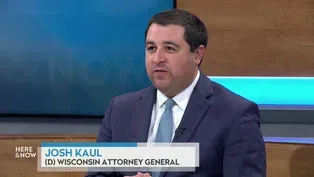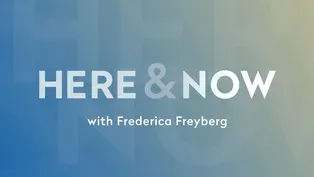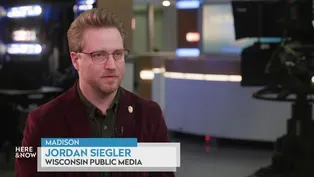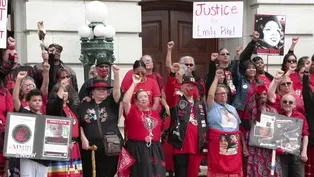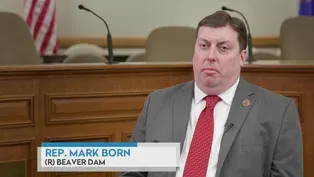Here and Now
Maternal Health Care in Wisconsin and the Future of Medicaid
Clip: Season 2300 Episode 2343 | 5m 59sVideo has Closed Captions
Mothers in rural Wisconsin are increasingly facing gaps in maternal health care coverage.
Mothers in rural Wisconsin are increasingly facing gaps in maternal health care coverage, and state lawmakers are considering legislation and budget proposals to address the issue through Medicaid.
Problems with Closed Captions? Closed Captioning Feedback
Problems with Closed Captions? Closed Captioning Feedback
Here and Now is a local public television program presented by PBS Wisconsin
Here and Now
Maternal Health Care in Wisconsin and the Future of Medicaid
Clip: Season 2300 Episode 2343 | 5m 59sVideo has Closed Captions
Mothers in rural Wisconsin are increasingly facing gaps in maternal health care coverage, and state lawmakers are considering legislation and budget proposals to address the issue through Medicaid.
Problems with Closed Captions? Closed Captioning Feedback
How to Watch Here and Now
Here and Now is available to stream on pbs.org and the free PBS App, available on iPhone, Apple TV, Android TV, Android smartphones, Amazon Fire TV, Amazon Fire Tablet, Roku, Samsung Smart TV, and Vizio.
Providing Support for PBS.org
Learn Moreabout PBS online sponsorshipNow".
>> Wisconsin faces a maternal health care crossroads.
While the state Senate just passed a bill to extend postpartum Medicaid coverage from 60 days to a full year.
The Assembly's history of stalling the measure leaves thousands of new mothers in limbo.
“Here& Now” reporter Aditi Debnath has the story.
>> With my daughter, I had really bad postpartum depression and it was a struggle.
>> Wendy Yuen is not alone in Wisconsin.
Two out of every five mothers give birth on Medicaid.
That's the program that provides health coverage to low income people.
Most states expanded Medicaid to cover postpartum mothers for a year in Wisconsin, mothers lose coverage just two months after delivery.
For many, that means no support.
During a time of immense physical and emotional change.
>> I was on leave when I realized that it was really bad.
So at that time I was only making 60% of my pay and I could barely afford to pay my mortgage and just be able to take care of my son and the new baby and myself.
>> Any expansion to Medicaid is highly likely in any given area or state to improve access that women have to prenatal care, intrapartum care, and postpartum care.
>> Doctor Ryan Spencer is an ob gyn at the UW-Madison Medical School.
He says the state is in a maternal health care crisis, in part due to years without Medicaid expansion.
>> I think we're actually in the long term impacts of having not addressed those for decades.
>> The state Senate's recent vote to extend postpartum Medicaid coverage to a year aims to address the need for care.
The bill, passed with support from nearly every lawmaker, signaling rare bipartisan agreement on the issue.
>> I think everyone else gets it.
Anyone who's had kids or anybody who's been around kids knows that the more that you can have that person to person attention and frankly, take things off the plate of that parent, the better.
>> But the Senate's vote contrasts sharply with Assembly Speaker Robin Vos.
Repeated blocks, he said ahead of the Senate vote.
>> My position has been fairly clear from the very beginning.
I've never supported an expansion of welfare.
I can't imagine that I would ever support one, but we have to talk about it as a caucus that everybody else is.
Snyder, who introduced the postpartum coverage bill in the Assembly, stresses that this is not a partisan issue.
>> I've told some of the opponents saying that if a mom dies a lot of times, that might mean the child has to go into foster care or, you know, things to that nature that's going to cost the state more than if we just help the moms, if they need the help.
So, you know, you got to sometimes talk to them about dollars and cents.
>> Wisconsin is now one of two states in the nation without a full year of postpartum Medicaid coverage.
that's covered under state insurance isn't really enough.
Like my daughter's one.
And I'm still struggling every day just to, like, keep up with all the things that I have to do to make sure that she's healthy.
>> The challenge is even greater for mothers living outside Wisconsin's larger cities.
Only about half of rural hospitals in the state offer labor and delivery services.
Many of those mothers are on Medicaid, which reimburses hospitals significantly less for services.
>> Increasing the reimbursement for obstetric care would undoubtedly increase opportunities for hospital systems to run effectively.
>> Availability of obstetric services in rural areas has gone down for more than a decade, according to the U.S. Government Accountability Office.
It is difficult for hospitals in rural areas to recruit and retain maternal health providers.
Also, a higher proportion of rural patients rely on Medicaid, which doesn't fully cover obstetric services.
The recent end of birthing services at a rural hospital in northern Wisconsin makes accessing care more difficult.
When Theta Care announced it would close its Waupaca birthing unit, the Common Council unanimously passed a resolution asking it to reconsider.
For its part, Theta Care said the needs and demands of expectant mothers are shifting.
Deliveries have been declining and mothers are choosing to deliver at larger birth centers.
The shortage of physicians and nurses in rural areas is an issue being felt across the country and in our region, as labor and delivery complexity is increasing.
>> What you see when you lose a birthing center for a community.
Increased number of births outside of hospitals.
You see an increased number of preterm births when you lose a birthing center as well, you lose the opportunity to get easy access to prenatal care and postpartum care because you don't have those particular clinicians in that area anymore.
>> The nearest full service hospital is now 30 miles away in Stevens Point.
That distance can make a difference in a labor and delivery emergency.
The Theta Care Hospital in Waupaca still provides postpartum and prenatal care.
>> Let's extend postpartum coverage for pregnant women on Badgercare up to one year after giving birth.
>> Governor Evers has once again included the postpartum Medicaid extension in his 2025 2027 budget proposal, alongside more than $18 million over the next two years to increase Medicaid reimbursement rates for obstetric services.
>> There's also a bipartisan bill to get it done that almost 90 legislators support.
>> With the budget debate heating up, Doctor Spencer warns that without action, more birthing units will close and more mothers will fall through the cracks.
>> We know that there is something going on related to the health, wellbeing and mortality of women giving birth in rural areas that for some reason is not experienced in urban areas.
The CDC has told us your zip code matters as to how risky pregnancy is for you, and we need to pay attention to that.
that.
Attorney General Josh Kaul on Suing the Trump Administration
Video has Closed Captions
Clip: S2300 Ep2343 | 8m 55s | Josh Kaul on why Wisconsin has joined lawsuits filed against the Trump administration. (8m 55s)
Here & Now opening for May 9, 2025
Video has Closed Captions
Clip: S2300 Ep2343 | 1m 1s | The introduction to the May 9, 2025 episode of Here & Now. (1m 1s)
PBS Wisconsin and a Push to Cut Federal Funding for the CPB
Video has Closed Captions
Clip: S2300 Ep2343 | 1m 55s | Jordan Siegler considers federal funding cuts to the CPB would affect PBS Wisconsin. (1m 55s)
Seeking Justice for Missing and Murdered Indigenous People
Video has Closed Captions
Clip: S2300 Ep2343 | 5m 15s | Advocates for missing and murdered Indigenous people seek funding for the MMIW Task Force. (5m 15s)
Rep. Mark Born on Lawmakers Building Wisconsin's 2025 Budget
Video has Closed Captions
Clip: S2300 Ep2343 | 21m 53s | Mark Born on the 2025 budget proposal by Tony Evers and Republican priorities. (21m 53s)
Providing Support for PBS.org
Learn Moreabout PBS online sponsorshipSupport for PBS provided by:
Here and Now is a local public television program presented by PBS Wisconsin
